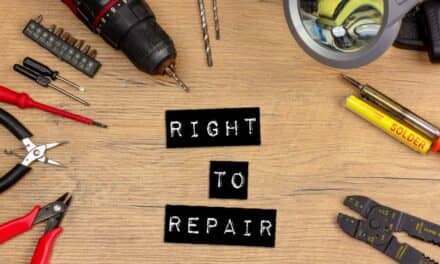By Gay Gordon-Byrne
Hospital ventilator availability has become the benchmark of progress during the COVID-19 pandemic. After all, pandemic news often includes patient counts of those on ventilators. The general public understands that having 15 ventilators and 20 patients is a death sentence for five people. People also understand that rural areas don’t have a lot of ICU beds—and even a small community outbreak can rapidly overwhelm local resources.
I believe it’s both bad politics and bad press for ventilator manufacturers to thwart access to repair. Several firms have relaxed their requirements as a result. But a healthcare system should not be based on the fickle largess of manufacturers at any time—and particularly not in a time of national crisis.
Additionally, the problem of equipment readiness and availability isn’t just about ventilators—it’s about the thousands of devices that are part of critical care. If, for example, a patient on a ventilator also needs dialysis, but the dialysis equipment isn’t available, the patient will be harmed. Therefore, it’s not practical to say “ventilators” are repairable but all other medical devices are not.
The Wyden Effect
The Critical Medical Infrastructure Act of 2020, introduced by Sen. Ron Wyden (D-Ore.) and Rep. Yvette D. Clarke (D-N.Y.) on August 6, is the first direct federal attack on medical repair monopolies in general. The provisions of the bill are linked to the period of the pandemic—a point that is disappointing to us, albeit practical and essential. We believe patients aren’t being served when equipment of any kind is “down for repair.” So every artificial block that can be waived should be waived.
Removing repair limitations on a temporary basis will also allow some essential data collection. Will original equipment manufacturers (OEMs) lose control of valuable intellectual property? Will patient outcomes be better or worse? What will happen with the mechanisms for product training?
Just as the Medical Imaging & Technology Alliance, or MITA, used Congress to demand a study on independent repair, MITA should welcome the opportunity to validate their assumptions about independent, in-house, and OEM repair business models. Unfortunately, the manufacturer lobbying group has taken the same position against the right to repair as it has in the past.
MITA’s argument: Hospital-directed repair techs aren’t reporting to the FDA. Insiders, however, know that this is just linguistic gymnastics since hospitals are responsible to the Centers for Medicare & Medicaid Services, The Joint Commission, NFPA 99, and others. Moreover, MITA continues to claim that its techs are better, while ignoring a long history of service delays and current pandemic limitations on non-employee access. The manufacturer lobbying group also throws out “cybersecurity concerns” to oppose the right to repair without providing any evidence that repair and security intersect in the real world.
The Critical Medical Infrastructure Act of 2020, however, requires OEMs to make all service materials available on fair and reasonable terms. That’s the basis of our right-to-repair legislation in states—and when it comes to copyright, patent, and other federal laws, only Congress can do more.
This is where the new legislation comes in. It waives copyright liability for breaking digital locks, removes patent infringement for making spare parts on a non-commercial basis, and invalidates contract terms that require exclusive use of OEM technicians. Finally, it requires the Federal Trade Commission to investigate the entire scope of repair monopolies.
The same conditions that prompted Sen. Wyden to pursue federal legislation are also getting attention in state legislatures, state treasuries, and with state attorneys general. In fact, we have some bill sponsors in states that exempted medical equipment considering un-exempting the category. Similarly, the Wyden effort is providing political cover for bolder engagement by governors and other executives.
At the same time, there is Congressional pressure from the U.S. House Judiciary Committee to investigate monopolies among big tech companies that use exactly the same tactics to protect their repair revenue stream. The light of day is helping expose unfair and deceptive practices while simultaneously educating the public.
Both antitrust and intellectual property laws have historically been nonpartisan. Right to Repair legislation is also proving to be a rare point of agreement between politicians. But, in a hyper partisan election season, it’s always possible that solid and valuable legislation will get gutted in a political turf war.
The full text of the announcement and a link to the bill is available here.
Gay Gordon-Byrne is executive director of The Repair Association. Questions and comments can be directed to 24×7 Magazine chief editor Keri Forsythe-Stephens at [email protected].






As an old school hi-tec cyber security red neck space junkie EMT volunteer, I can confidently suggest OEM’s, Health Care institutions & Big pharma all have a fine line to maneuver.
That being said there is finite wiggle room for doing no harm concerning patients lives and legal rights that are being denied by all parties.
The cyber security threat truly, already breaches safegards previously determined sufficient. Unless networked medical hardware & software of even the most recent, simplest or tiniest devices are hardened the continuous unlawful intrusions actively grow at alarming, even horrific rates. Near exponential IoT technology growth, span and, more concerning- depth is for the greater populous unknown. For those of inquiring mindset it can nearly boggle the minds; most assuredly mine included.
For patients – no excuse presentable by OEM producers are acceptable. Followed closely by big pharma with some of the most known plus unexpected healthcare institutional facilities and providers closing in.
Their only humane solutions: Apply all avenues of solution efforts using all assets imaginable, using far more personnel everywhere sooner rather than later; before the healthcare war reaches a critical mass. Hire and train the populous- those of which are ready, desiring and eager to overcome and overwhelm attacks upon life and undue shortened lifespan quality. Stockpile: PPE, essential potable water, food supplies, medical supplies, necessary sundries, fuel reserves, emergency equipment & tools and win this war at hand. Choose not to perish. Be resolute as Purveyors of Life; yours could need life saving at any moment. Do not repeat history. We are under daily attack on most fronts, we are at war with constantly changing enemies in kind and devised.
Uncle Sam- zip up your britches and pull yourselves by the boot straps and do the job America hired you to do and halt wasting tax payer assets, cease all corruption, stand on your own feet and do not spend tax revenue wrecklessly.
States- put on your entire armour, ready for battle and enact States Rights required by the citizenry. We pay your salary as well.
ol’man